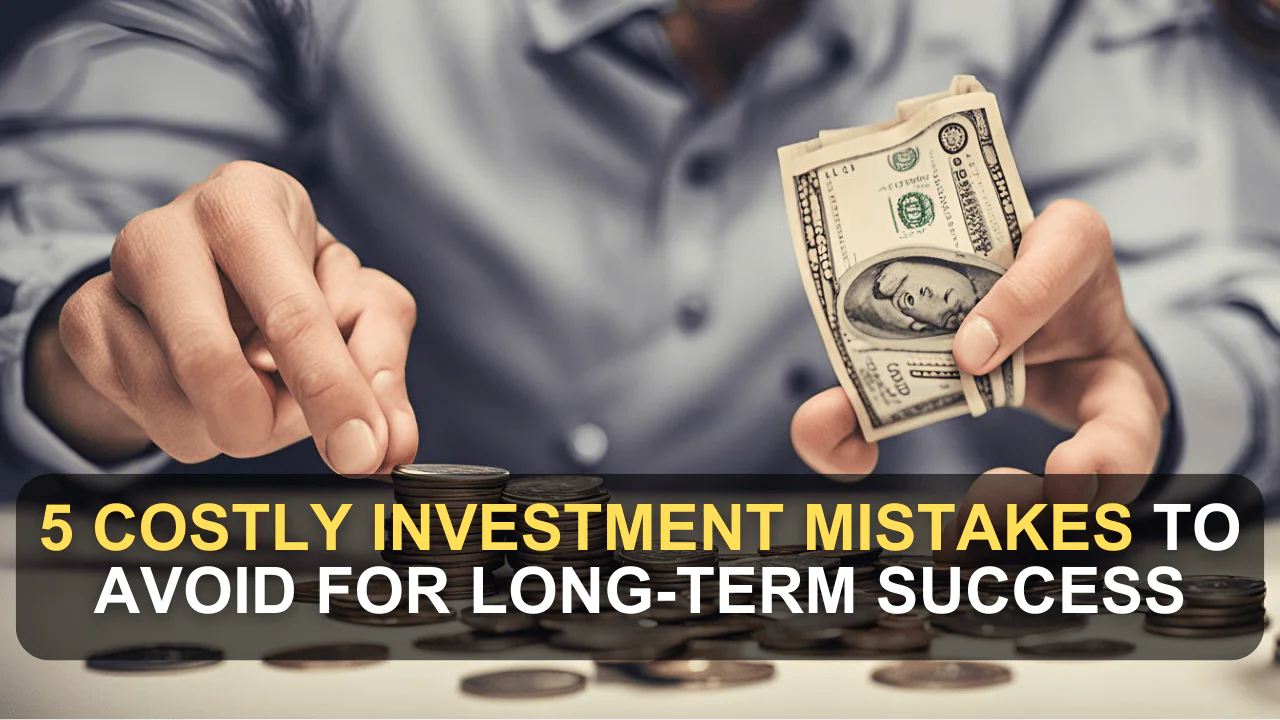Savings are one of the key ways through which people generate riches, but even a slight error when investing can see your plans go up in smoke. Given the above aspects, it is important to know these pitfalls to avoid to have a successful investment experience. The following are five of the costliest mistakes you can make in investment that can slow down your progress and ways of avoiding them.
Table of Contents
Not Defining Your Financial Target Before Investing
The main mistake that investors make in practice is the lack of strategic goals and the absence of clear objectives that are necessary to achieve in the process of investing. Nurturing monetary targets, whether it is providing education for your child, going for a world tour, planning for retirement, or financing a wedding, requires clear goals. Through having well-defined goals, goals provide the feeling of the amount of money that has to be saved or invested to meet a specific goal. It enables one to have a clear vision of investment strategies that best fit them within specific risk and return levels and the time horizon to it.
For instance, though equities may fluctuate in the short term, they are characterized by better returns in the long run than any other form of investment. If your goals are for the long-term horizon, it would be beneficial to invest in equity-related –instruments to amass large fortunes.
Confusing Insurance with Investment
Another error is the issue of insurance with investment. It is a service whose main and overall purpose is to ensure that your family has the necessary means to take care of all their needs if you pass on. While purchasing a life insurance policy, it is advisable to go for a cover that is about 10 to 15 times your annual earnings. However, the majority of investors get it wrong by investing in endowment or money-back policies which they think provide both investment income and insurance risk. However, these products typically offer poor or insufficient life coverage, low yields, and rather poor flexibility. Instead, the term insurance policies are much better with the higher amount of insurance coverage available for lower premiums.
Excluding the Inflationary Effects in the Process of Attaining Financial Objectives
Inflation is perhaps one of the stealthiest wealth eroders that are out there and they do not receive much attention from investors. Thus, should inflation not factor into your plans, you will be shocked to discover that your savings barely meet your plans. Inflation is a force that continually reduces the value of the money that you have in your possession and therefore has to be taken into consideration when it comes to the use of investments. The experience suggests that equities remain the most efficient investment instrument in terms of providing the excess return over inflation and a target-specified financial goal. However, you must always have your appetite for risk in mind whenever you are planning on investing so much in equity-related products.
No investor should leave their emotions free to sway them in the way they handle investment affairs
It has been established that investing based on feelings is one of the dangers that investors are usually exposed to. The investors become the result of emotional mainly due to fear and greed: people buy stocks during their peak due to greed while selling during a slump due to fear. To eliminate these lapses, you should consider systematic investment plans (SIPs) in mutual funds. SIPs thus help in disciplined investment as the amount keeps getting invested regularly enabling you to invest using rupee cost averaging. Also, making provisions to have a “Market-crash fund” allows you to invest in low-priced equities once a crash occurs, and can help to achieve your financial targets with lesser funds.
Not maintaining enough in an emergency fund that would be required in case of an emergency
An emergency fund is your financial umbrella; it is money set aside to cater to basic needs in case your income is cut due to circumstances such as job loss, or sickness among others. Ideally, this money should be enough to ensure that you can meet all those expenses that you can’t avoid each month, like EMIs, SIPs, Insurance premiums rent, etc, for at least the next 6 months. If you have not established an adequate amount in an emergency fund, an emergency may make you sell long-term investments or even borrow at exorbitant interest rates. This can be especially painful for investments when it is its nadir and the scale of losses might be locked in to be greater than it already is out there. Hence, there is a need to dedicate sufficient resources to the establishment of an adequate emergency fund.
Key Issues to Bear in Mind So That You Do Not Make Common Mistakes with Your Investments
To be a successful investor one has to be disciplined, plan and be ready to note the risks that come with his or her investment. Setting proper financial objectives as well as choosing the right insurance products, proper diversification, thinking about the inflation rate, not allowing oneself to be prone to various feelings, and having an emergency fund will help to prevent such misconceptions and stay on the right financial track.




